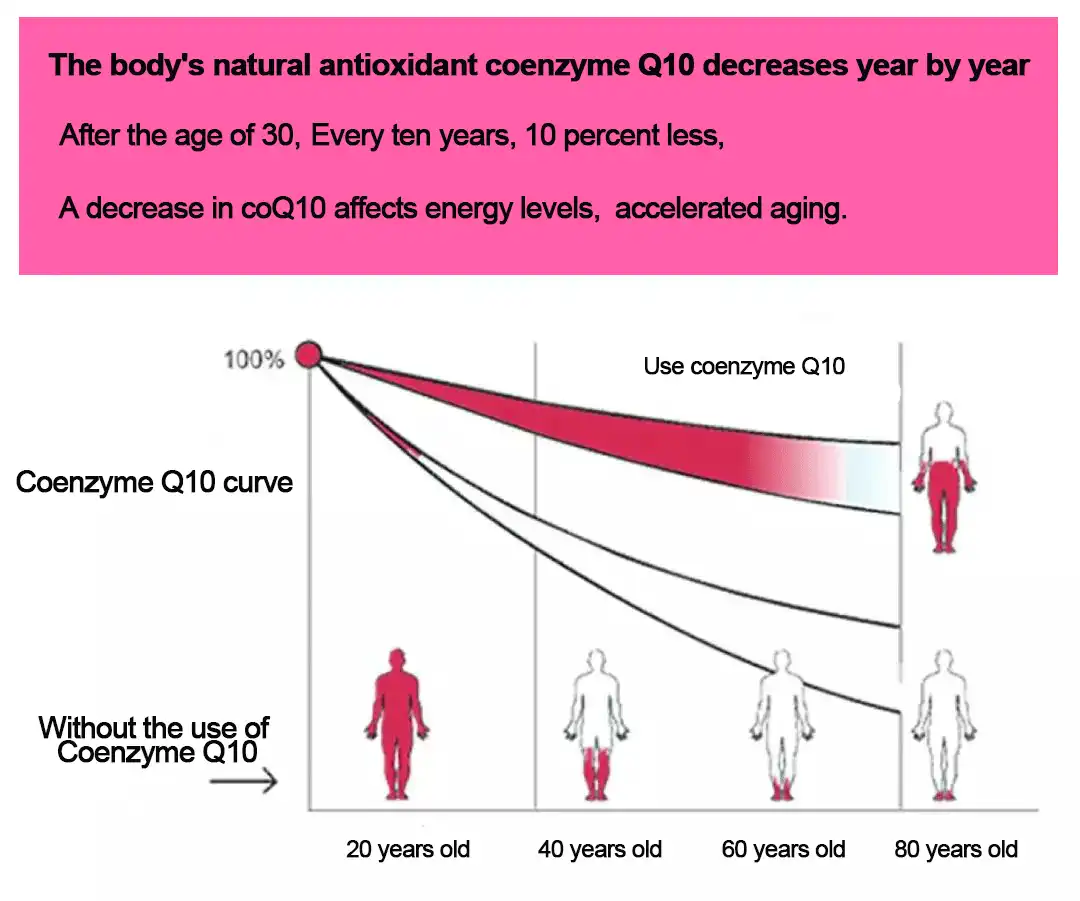What Does Coenzyme Q10 Do for Your Body
2024-04-20 23:41:06
As the only coenzyme Q 10 substance in the human body, coenzyme Q10 was first discovered in the mitochondria of bovine heart cells in 1957 by Professor Frederick Crane of the University of Wisconsin, USA. Dong Feng, an attending physician at the Department of General Internal Medicine at the Affiliated Hospital of Shandong University of General Medicine, said that the concentration of coenzyme Q10 in the human body is the highest in the heart. It mainly comes from food supplements and self-synthesis. It not only serves as an activator of cell metabolism and cellular respiration, but also serves as an important of natural antioxidants and non-specific immune enhancers.

What are Coenzyme Q10?
Coenzyme Q10 is a cofactor of a type of enzyme and is a fat-soluble nutrient. It is very important in the human body. Its role is to carry and transfer the electrons, atoms or active groups of the "substrate" in enzymatic reactions.
Because it plays a role in maintaining mitochondrial function, it is also called a mitochondrial activator. It exists in two forms: oxidized (ubiquinone) and reduced (ubiquinol).
In a healthy human body, coenzyme Q10 is mainly in the reduced form (accounting for more than 98% of the total coenzyme content). The ratio of oxidized and reduced forms will change with the person's physiological and case conditions.
The Main Biological Functions of Coenzyme Q10:
1. Coenzyme Q10 helps to protect your cardiovascular system.
Coenzyme Q10 has been shown to support heart health in a number of ways. It helps to improve the function of the endothelium, which is the lining of the blood vessels. This can help to reduce the risk of heart disease. Coenzyme Q10 may also help to lower blood pressure and prevent the formation of blood clots.

2. Coenzyme Q10 powder is a powerful antioxidant that helps to protect your body from free radical damage.
Free radicals are harmful molecules that can damage your cells and contribute to aging and disease. Coenzyme Q10 is a powerful antioxidant that helps to neutralize these harmful molecules and protect your cells from damage.
3. It may help to improve energy levels.
Coenzyme Q10 plays a critical role in the production of ATP, which is the primary source of energy in your cells. By supplementing with Coenzyme Q10, you may be able to improve your energy levels and combat fatigue.
4. It may help to support healthy skin.
Coenzyme Q10 has been shown to have anti-aging properties that can help to improve the appearance of your skin. It helps to reduce the appearance of fine lines and wrinkles, and may also help to improve skin texture and tone.
5. It may help to support healthy brain function.
Coenzyme Q10 is important for maintaining healthy brain function. It helps to protect the brain from free radical damage, and may also help to prevent age-related cognitive decline.
What Foods are High in Coenzyme Q10?
Coenzyme Q10 is a substance that can dissolve fat and is similar to vitamins. Foods containing coenzyme Q10 include animal liver, beef, corn, etc.
Pork liver: Pork liver also has a relatively high content of coenzyme Q10. Generally, every 500 grams of pork liver can help provide about 25 grams of coenzyme Q10.
2. Beef: The content in beef is also relatively high. Eating more beef appropriately has a certain nutritional effect on the heart, and can help relieve hypoxia caused by myocardial ischemia to a certain extent.
3. Corn: The content of corn is also relatively high. You can eat more corn in your daily life to help supplement the nutrients of your body needs.
Others, such as red meat, nuts, crude vegetable oil, broccoli, spinach, rapeseed, carrots, sweet potatoes, lotus roots, corn, eggplant, tomatoes, soybeans, oranges, etc., also contain relatively high levels of Coenzyme Q10.
Do I Need to Take Coenzyme Q10?

Dietary supplementation with CoQ10 is an effective way to increase individual CoQ10 levels. The content is relatively high in foods such as animal offal (heart, liver, kidney), beef, pork, saury, sardines, snakeheaded fish, peanuts and soybeans. For most ordinary people, there is generally no problem of coenzyme Q10 deficiency. Therefore, it is not recommended for healthy people to use pharmaceutical Coenzyme Q10 supplements.
During the treatment of certain heart diseases such as viral myocarditis and chronic cardiac insufficiency, Coenzyme Q10 can be supplemented for auxiliary treatment. The general effective dosage is 10 mg, and the recommended dosage is 10 mg each time, 3 times a day.
In conclusion, Coenzyme Q10 powder is a powerful antioxidant that can provide many health benefits. By supplementing with this important nutrient, you may be able to improve your cardiovascular health, protect your cells from free radical damage, boost your energy levels, improve the appearance of your skin, and support healthy brain function. If you are interested in adding Coenzyme Q10 powder to your supplement regimen, be sure to speak with your healthcare provider to determine the appropriate dosage for your individual needs. If you want to learn more about that, please send inquiry to Email: admin@chenlangbio.com.
Send Inquiry
Related Industry Knowledge
- What is Olive Leaf Extract Powder Good For
- What Functions of Cnidium Monnieri fruit Extract Powder
- What Applications of the Konjac Extract Powder Glucomannan
- What are the Side Effects of Green Coffee Bean Extract Powder
- Pure Lycopene Powder and Dosage
- What does Garlic Extract Powder Allicin Do to Bacteria
- What is Kola Nut Extract Powder Used For
- How Can Dehydroepiandrosterone DHEA benefit Your Health
- Frankincense Extract for Sale and Frankincense Extract Benefits
- Unveiling the Wonders of Phloretin Powder Extract from Apple Peel

